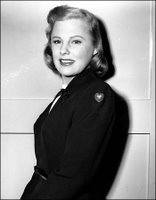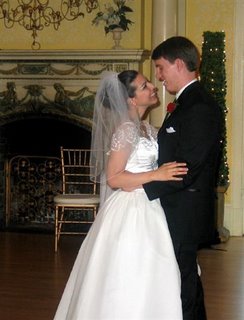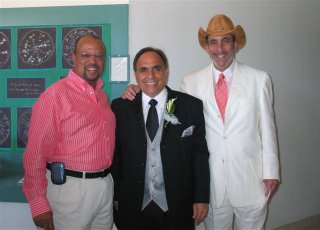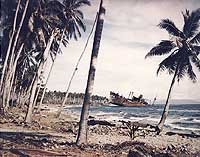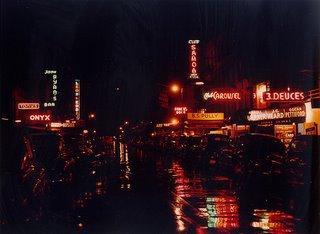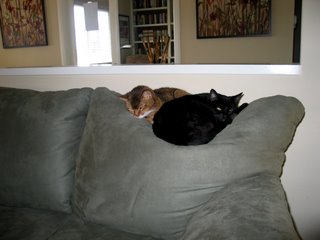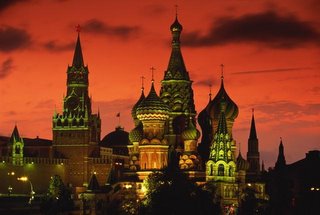
I
The collapse of a marketplace roof in Moscow last week, killing at least 56 people, caught the world's attention. Newspapers ran articles, with photographs, of rescue workers searching the rubble for survivors. The weight of heavy snow on the roof was the preliminary explanation for the collapse; Moscow Mayor Yuri Luzhkov was quick to rule out terrorist activity.
Where Moscow goes, tragedy follows. This time it was a collapsing roof. Last time it was an auditorium full of theatergoers held hostage, with a bungled government rescue attempt that left many dead. What will it be next time? Whatever it is, I expect it won't be good.
And every time I open a newspaper or log on the Internet and read about a bombing, hostage situation, collapsed roof or some other terrible thing going on in Russia's capital, I don't just cluck my tongue with dismay, mumble some piety about human suffering and then move on to the sports page. I fret. I worry. I check my map of Moscow to see where the latest catastrophe struck and then, perhaps, worry some more.
You see, I have family there. Sort of.
I used to be in the Foreign Service, and no, I wouldn't be surprised to hear the question "What's that?" Believe it or not, most of my fellow Americans don't give much thought either to foreign affairs or to how they're conducted.
America's "Foreign Service" is a concatenation of federal agencies, operating under the umbrella of the U.S. Department of State, which conducts business at American embassies and consulates overseas. It includes the State Department, USAID, the Foreign Commercial Service and a few other, smaller agencies. USIA used to be a separate part of it, but its functions have been taken over by State. Depending on the size and location of the mission, other, non-affiliated federal agencies such as the FBI, the Secret Service and even the military will operate under the same roof as the diplomats, but they answer to their own head offices in Washington.
And then of course there's the CIA, which is everywhere, nowhere and not popular. The Agency pretty much keeps to itself overseas, which is fine with everyone else, because in most embassies and consulates, at least the ones I've worked in, nobody particularly likes the "spooks." There is resentment over the fact that the CIA is given enormous amounts of money each year by Congress and doesn't have to account to anyone for how it's spent. No doubt as a direct by-product of such fiscal favoritism, Agency employees tend to treat their State Department counterparts as poor relatives, which doesn't do much for spook popularity in the embassy cafeteria.
But I didn't sit down this morning to discuss the turf wars of American bureaucracy.
I was a State Department employee for more than 13 years. Before leaving the government in 1999 to take a marketing job on the east coast, I had served in Frankfurt, Germany; Brasilia, Brazil; Abidjan, Cote d'Ivoire; Moscow; Washington D.C. and then Bonn, Germany. (My career at State ran a neat 10-year cycle: it began and ended in Germany.)
They say in the Foreign Service that you always maintain a special affection for your first overseas post. And yes, I can say that Frankfurt-am-Main will always have a very nostalgic tug on me. I was 30 years old when assigned there, and had never been out of the United States unless you count haircuts in Tijuana and bullfights in Mexicali. Now all of a sudden I was going to central Europe, and for two years, no less. I had always longed to visit Europe; having the government send me there, fresh from Washington, was a giddy experience, never to be forgotten.
But the foreign service post that really grabbed my heart, and has never let go, was not my first, but my fourth and next-to-last: Moscow.
The circumstances of my assignment there probably had something to do with the enchantment. One joins the Foreign Service dreaming of seeing the world's great capitals. Nothing against Brasilia and Abidjan, but they are both rather sleepy, out-of-the-way cities. By the time I volunteered for a transfer to Moscow in the winter of 1993, I had spent nearly five years at these two off-the-beaten-track diplomatic posts.
When I got word that I was indeed going to Moscow, suddenly a life that had been floating downstream in the subtropical west African heat seemed to mash down on the accelerator.
I spent two months in Washington, D.C. that spring, going through elementary Russian-language training. My classmates were mostly employees of a private contracting company, preparing to go overseas and perform ancillary services at the embassy in Russia. Most of them had never been overseas at all, and you could feel the crackle of expectation in the fragrant spring air. We talked excitedly amongst ourselves, the sentences often beginning with "When we get to Moscow..." It had only been a year and a half since the collapse of the USSR and Russia was still in her post-Soviet "wild west" period, which gave the prospect of going there just a dash of danger that made it more exciting still. On cable television we were able to watch The Moscow Evening News dubbed into English, and we watched it every night, following the drama that we would soon be seeing first-hand.
On May 23, 1993, I arrived in Moscow. I had finally made it to "one of the world's great capitals." An air of magic and unreality prevailed: late May is just about the best time of the year to visit Russia--not only is the long, harsh winter over by then, but with summer coming on, you're getting close to 20 hours of daylight. Moscow sits at close to 56 degrees north latitude, and its summer days are very long: dawn begins shortly after 3 a.m., and there is still lingering twilight at 11 p.m. Surely the long, long days helped create the feeling of magic.
The feeling of unreality had to do with the contrast between life behind our embassy wall and life beyond it. The American compound in Moscow has often been called "Fort Apache," and with good reason. Built during the Soviet period, with its prevailing "circle the wagons" mentality, the American compound is entirely self-contained. I actually heard of Americans spending two years in Moscow without ever leaving the compound. Imagine living in Moscow and not even bothering to visit Red Square! (Foreign Service life is wasted on some people, but that's a subject for another discussion.)
But if the "Golden Ghetto" is indeed what you want from Foreign Service life, AmEmbassy Moscow is the place for it. The compound contains everything needed for American-style existence: cable TV; a fully-stocked commissary; a video store; a gymnasium with swimming pool and Nautilus equipment; a barber shop/beauty parlor; a cafeteria, a library and even its own bar. If all you want to do is go to work and go home, you can spend two years at the American embassy in Moscow and hardly notice you've left Cedar Rapids.
There lay the unreality: here I was, 6,000 miles from home, in this gigantic, historic city in the middle of the world's largest country, (11 time zones) torn by its own struggle to throw off 75 years of communist mismanagement and move on to a new future. In fact, Russia came close to civil war a few months later, with me standing right there watching. But amidst all of this, I was able to recline in my American-style bathtub in my American-style apartment inside the walls of Fort Apache, beer in hand, and feel as if everything "Russian" were very far away.
But I'm not a Golden Ghetto guy, although on a compound that contained so many creature comforts, I could see where people might become that way very quickly without noticing it. I unpacked, put away my things and got into the rhythm of going to the office each morning. I worked in the communications unit, a area with no windows, which probably helped maintain the feeling of living in a 24-hour environment where it was never really night. Time starts to get away from you quickly in such a setting.
In fact, pretty soon eight days had gone by and I realized that I hadn't been off the compound myself yet. I hastened to correct that, visiting, in rapid succession, Red Square and Lenin's tomb; the flea market at Ismailovo Park; Zwemmer's, the English-language bookstore near Kuznetski Most, and of course plunging into the redolent, rough-and-tumble world of the Moscow Metro, which is unlike any other subway system I've ever ridden--just go and experience it, if you ever get the chance.
Some of my confreres from the embassy were squeamish about eating the local food, and would only eat stuff from the American commissary. Not me: in a none-too-clean hotel grill near the Ismailovo Metro station, as my companion stuck to bottled beer, I dove hungrily into local shashlik, and with no ill-effects, I'm happy to say. Flavored vodka and Cuban cigars were available, cheap, at the street kiosks which were everywhere in those days, but which later disappeared as Russia's economy began to gain a more even keel. I hiked with a friend down to Gorky Park one morning, where they were having the annual May celebration honoring the Border Guards. Drunks were everywhere of course, and while we were there we also saw a scene right out of Sergei Eisenstein: a pit bull had gotten off its leash and was attacking a horse. What a wild and crazy place! I hadn't felt so exhiliarated by the experience of a city since the first time I visited New York.
And of course I made Russian friends. I met Sasha through a stateside acquaintance; he was a computer weenie and English teacher whose English was, not surprisingly, superb, and we struck up a friendship quickly. He would come to the embassy on Saturday nights and we would watch American movies together on video. Then Sasha introduced me to his little girlfriend Anya, a student of his who spoke very little English but picked it up rapidly as we got to know each other better, and by the way made a brave, dogged, doomed attempt to improve my Russian. Next I met Sasha's brother Boris, known to friends and family as "Bob." Bob was an authentic movie nut, Liza Minelli his idol. He enthusastically joined our Saturday-night filmfests, which came routinely to include dinner, myself as host.
Then finally came Nadya, who, bless her heart, got me into trouble.
An English teacher like Sasha, (they had met teaching English at the Moscow Engineering Institute) Nadya was a classical-music enthusiast who, like many Russian girls, had once dreamed of becoming a ballerina and in fact had worked very hard for several years at her dancing. Nadya's training as a dancer was evident in the way she moved: I was enchanted by the way she would cross a room or a street with the flowing grace of a gazelle. After Sasha introduced us, Nadya and I began attending the opera and classical concerts occasionally. Among other things, we saw Tchaikovsky's Pique Dame at the Bolshoi Theater and pianist Mikhail Pletnev at the Moscow Conservatory. Soft-spoken and well educated, with beautiful brown eyes and a kind, gentle smile, Nadya also joined our little dinner circle, coming to my apartment for the first time at Thanksgiving.
Within six weeks I was in love with her. And although she was cagey in that eternally-feminine way, Nadya gave hints that she did return my feelings, at least enough to matter. Thence came the trouble: in 1994 the State Department had not yet gotten around to lifting its cold war-era ban on fraternization with Russian citizens. Some busybody reported to the embassy security office that I had been seen on the street holding hands with and kissing someone who fitted Nadya's description.
The next thing I knew, I was on a plane back to Washington, where I was promptly raked over the coals by a couple of officious little Diplomatic Security goons in yellow neckties who thought a little hand-holding at the Bolshoi just had to mean that I had four or five commies under my bed. They done-thunk they'd caught theirselfs a SPAH! (You can also bet they done-thunk they wuz gonna get theirselfs a PROMOTION for it.)
My assignment to Moscow was immediately broken. But the hopes of the officious goons at DS that they would get promotions for breaking up a spy ring were to be dashed: they were able to find no smoking gun, no evidence of counterintelligence activity, nothing. They couldn't even rap my knuckles for sleeping with Nadya, because the truth was, at that point, I hadn't. All they could do was reassign me to Washington. Within a few weeks I was twiddling my thumbs at a desk at State Annex 34 in Springfield, Virginia, a few miles south of D.C. There I would sit for the next two years, mostly reading the newspaper and playing solitaire.
II
That might have been the end of the story. But falling in love with Nadya had only cemented a feeling that had been growing ever since I had first sat down with this little group and shared a convivial meal, followed by a screening in my living room of Butch Cassidy and the Sundance Kid or The Right Stuff.
That feeling was that I had come to regard Sasha, Bob, Anya, Nadya and Bob's girlfriend Masha (who joined us later, and who by the way looked a lot like Liza Minelli, and who today is well known to Moscow radio listeners as Masha Makeeva, entertainment reporter for Russkoye Radio) as my family. And I wasn't about to allow the State Department's in-house gestapo to separate me permanently from my family, particularly not the most important person in it. Since I was already in love with Nadya anyway, she became the focal point of my efforts, which were (a) To hasten the end of the "non-fraternization" policy in any way I could, or (b) To find another job, in the private sector, so that I could tell the State Department to kiss my big, fat, hairy French-Canadian ass and be reunited with Nadya just as soon as I could scrape together the air fare.
I did what any red-blooded, pissed-off American would do in such a circumstance: I wrote a letter to my congressman.
At first I wasn't sure which member of Congress I should write to. But then, remembering that I was still registered to vote in Chula Vista, California, I decided it should be 51st District Rep. Bob Filner, a Democrat who at that time was serving his first term.
In two pages, I sounded off to Filner about the knuckle-dragging idiocy of continuing to adhere to a policy that had clearly sprung from the Free World-vs.-Iron Curtain paradigm, when the USSR had now been officially dead for more than two years.
Filner has been re-elected five times since then, and one of the chief reasons is because his staff is so good at answering correspondence. Filner's office pixies really earn their pay: when you write to him, you generally get an answer within days. I did, anyway; Filner's sympathetic reply expressed concern over what had happened to me in Moscow, and he said he would have his staff look into the matter.
Over the next few months, as I corresponded with Filner's office and sundry other entities including the Washington Post and the White House, (whose intramural boneheads promptly forwarded my correspondence to the State Department, which just as promptly sent me a letter slapping me on the wrist for such presumption) I learned some interesting things.
For one, I learned that back in August of 1993, just three months after I'd arrived in Moscow, President Bill Clinton had signed an executive order instructing all agencies doing business overseas to re-evaluate (which meant change) all of those outmoded policies whose purpose had been to minimize contacts between Americans and citizens of the so-called "bloc" countries. In other words, the end of "non-frat," as we called it, had already been mandated: months before I was turned in for the crime of hand-holding with a former Komsomolka, the White House had already told everyone to get the lead out and discard the very policies under which I was ordered out of Moscow. The State Department, I learned, had been spending $1.2 million a year enforcing a dinosaur policy left over from the Nixon-Brezhnev days.
My source for that money figure, by the way, was an unimpeachable one: Peter Flynn was Administrative Counselor at the American Embassy in Moscow when I was there. He knew better than any American in Russia how much money was being spent, where and for what. It had fallen to Peter to call me into his office one morning after I had been ratted out, to inform me that I was being immediately sent back to the States.
When I began protesting the lunacy of maintaining "non-frat" in post-Soviet Moscow, where Americans were marrying Russians left and right, Pete simply held up his hand. "You're preaching to the converted," he told me. "It's costing us $1.2 million a year to enforce that policy." He then proceeded to recite the other ways in which, as an administrator, he found "non-frat" a thorn in his own side.
But in many ways the American mission in Moscow was a mirror-image of the totalitarian regime it was originally put there to monitor and watch, and in no way more than the influence and power the Regional Security Office wielded over the mission. "The RSO runs Moscow," it was said, and with a great deal of truth. Pete Flynn was third in command at the embassy after the ambassador and the Charge d'Affaires, but he could do nothing for me. The RSO's hyperventilating paranoia about counterintelligence trumped everything. I was on that plane back to Washington the day after we spoke in Pete's office.
But as my letter-writing to Filner, Clinton, the Senate Foreign Relations Committee, The House Committee on International Affairs and Washington Post columnist Mary McGrory should have made clear to anyone, I wasn't about to be quiet about this. Boat-rockers in the State Department don't prosper; the Good Ole Boy network at Foggy Bottom is as airtight as was the court of Louis XIV: anyone who runs afoul of it in any way becomes a leper. There was a legend about the guy who kicked up such a fuss about smoking in State Department offices that he managed to get an agency-wide ban on smoking imposed. He was also promptly marked as a troublemaker and was never promoted again.
I expected the same fate, and I didn't care. I had been working in communications at State for nine years by then, had only taken the job because I wanted to travel and was beyond tired of it, and it didn't matter to me if I remained in my current grade until asked to retire. I'd ceased thinking in terms of "career." All I wanted at that point was to make some stupid people uncomfortable, and if at all possible, to hold Nadya in my arms once again.
Just as the affair in Moscow had been more Peyton Place than John Le Carre, so the business in Washington turned out to be more waiting game than confrontation. Yes, I had the emotional satisfaction of annoying a few bureaucratic microbes with my letter-writing and phone calling, but since the wheels had already been set in motion by Clinton's executive order, issued while I was still enjoying summer afternoons in Moscow, the only thing I really had to do was wait. But that's my problem: I've never been a good waiter. (I used to tell my Russian friends that I never could have managed as a Soviet, having no patience at all for standing in lines, which is what Soviet citizens spent half their lives doing.) And of course, bureaucracy being what it is, nobody ever knows how long the wait will be.
But one morning in May, 1995, almost two years to the day after I'd arrived in Moscow and 11 months after I'd been sent home, I was puttering around my tiny apartment on Capitol Hill, making coffee, ironing my shirt, preparing to drag myself to Springfield for another day of solitaire and newspaper reading. I'd switched on the Today show and had one ear on it as I schlepped around sipping coffee and getting dressed. Before they cut to the first commercial break, the teaser for the upcoming news headlines included, "...and Americans in Moscow can love a little more freely now. We'll tell you about that when we come back."
I was there when they came back, all right.
"Non-frat" had been lifted. Sort of. The new policy, over which the newsies were snickering, was jocularly being called "Kiss-and-Tell." Americans at the embassy in Moscow were free to date the locals now, but with the requirement that the names of any locals they dated had to be reported to the RSO.
My friend Lena, who taught Russian at the Foreign Service Institute and through whom I had met Sasha two years earlier, lived a few blocks from me, closer to the U.S. Capitol. She had been following this saga right along with me, had even translated into Russian for me a letter I wrote to Nadya's mother a few months after the storm broke. Lena didn't drive, so I usually picked her up in the mornings and drove her to her bus stop on our way to work. But I couldn't wait, that morning, to get over to her place and give her this news. I picked up the phone and called her.
"Oo men'ya novost'i ochen' prekrast'ni," I said. ("I have wonderful news.")
She didn't have to ask what it was. "Oh, my GOD!" she said.
How lightly were the news media treating this story? The Washington Post ran it that morning, not in the world news section, but in the Style section, where they ran fluffy features and funny stuff. "In Moscow, love thaws the cold war," the headline read. Style section or no, I clipped the item, put it into an inter-office envelope, looked up the office address of the chinless, slope-shouldered little DS rat who had been assigned to jerk me around the year before, and sent it to him.
Nadya and I were reunited, that summer, on Spain's Costa Brava. We spent two weeks on the beach, in the party town of Lloret de Mar, with side-trips to nearby Barcelona. Nadya had cut her hair very short, and she looked incredibly beautiful in her blue two-piece swimsuit. I hadn't realized what a lovely figure she had: in Moscow I had only seen her bundled up in winter clothes.
But here's where the fairy-tale ends. Our brief winter idyll back in Moscow had had all the hallmarks of early infatuation: long phone calls, furtive gazes, little discoveries, mutual admissions of thinking about each other constantly. I don't think either of us realized at the time how big a role prohibition played in this: Nadya was forbidden fruit, and as the Russian poet Yevtushenko said, stating the obvious, stolen apples taste better than bought ones. Now that we were allowed to see each other, mostly what we did was bicker. And not about spy stuff, either, but about the sorts of things you might expect any not-too-compatible couple to bicker about: who took the room key; you spent too much time in the bathroom and we missed the bus; I want to go on a tour, and you just want to sit on the beach and drink beer. And here was a biggie: "Stop criticizing socialism! My country used to be great!"
My gentle response to that one: Your country still is great, babe. And always will be. England's greatness lies in Shakespeare, parliamentary tradition and the Lake District, not the fact that she once possessed an empire. Russia's greatness lies in Tolstoy, Pushkin, birch forests; a spiritual tradition of suffering and survival that inspires the rest of the world, and oh yes, let's not forget those little meat pies I can't get enough of. There will always be an England and there will always be Russia. Marx and Lenin sold you a bill of goods, but that's over and done with. Move on.
Yes, we bickered. But she also sang Russian songs to me as we stood together on the rocks above the beach after supper at our hotel, and I sang American songs to her. We went for long walks and talked a great deal more than had been possible in Moscow. We swam in the Mediterranean. We shopped in nearby Tossa de Mar. We rode on a carousel in Lloret's town square. We attended an aquatic show, where Nadya clapped her hands and laughed like a little girl at the antics of the dolphins. I'm probably the only American who ever toured Barcelona with a Russian-speaking tour guide: a bus tour was part of Nadya's package and I came along, the only native English-speaker on a bus full of Russians. And yes, we made love.
And yes, when I got back to Washington I sent "the memo" downtown, as the new policy required. I never heard an official peep out of anyone about it.
III
In the years since then, I have seen my "family" at intervals, and on both sides of the pond. Nadya could never be induced to visit America; given the nature of the trouble she got me into in Moscow, I think she always feared that if she showed up on these shores, she would find herself pounced upon by the FBI or some other overly-inquisitive government agency. But we saw each other in various European venues over the next few years: Munich; the Mediterranean coast of Turkey; the Adriatic coast of Croatia. And yes, I did return to Moscow for unofficial visits a couple of times, in 1997 and '98.
But over the years, Nadya's and my relationship has gradually metamorphosed from romance into a sort of affectionate cultural exchange program. She sends me books by Bulgakov, Kuprin and Ludmila Ulitskaya; I send her Jack Kerouac and Saul Bellow.
This shift was probably inevitable, given the enormous geographic gulf between us, plus the fact that Nadya made it clear, very early on, that she had no interest in leaving Russia to come live in the United States. Long-distance romance is a zero-sum game, just ask anyone who's ever played it. We met at the seashore one final time, in 2000, in the little Croatian resort town of Cavtat. I have not seen her since, although we visit on the phone occasionally. When I returned to Moscow in the late 1990s, she took great pleasure in serving as my tour guide, walking me through the Kremlin; past the statues near the Patriarch's Ponds commemorating the fables of "Grandpa" Kruilov; through the Tretyakov art gallery and of course, for long walks in Kuskovo Park, not far from where she lives. Her mother, Nina, speaks no English but is delightful and has always treated me like, well, like family. Nadya and I still bicker now and then, from our opposite sides of the globe, (I've had to learn not to bring up Stalin's name) but we laugh a lot too.
Anya, my sweet little former tutor from Moscow days, worked for several years for the Pepsi-Cola company at its offices near Sheremetovo airport. When I returned to Moscow in 1997 for a week's visit, she commandeered a company car, met me at the airport and took me into town, to the apartment of the Americans I was staying with on Kutuzovski Prospect. One spring during my second and last tour of duty in Germany, she was rewarded by her company for an especially productive quarter with a weekend in Prague. That's just a short hop from Germany, and I drove down to Frankfurt, got on a plane and met Anya and her friend Katya in Prague, where we spent a pleasant weekend walking around that beautiful city, noshing on pizza and reminiscing. Anya got married in 2000 and today has a little boy, Matvei, who is about to turn 6 years old as I write these words. We stay in touch by e-mail and, once in a great while by telephone.
Boris, aka "Bob" is the family member I've seen most often on the left side of the Atlantic. Bob proved himself very adept at "working" post-Soviet society. He has been involved with a number of NGOs, and through them wangled numerous trips to the United States in the late 1990s to attend various workshops and conferences. He spent a year in Baltimore teaching Russian at a school run by the Quakers, and we saw a lot of each other that year as I was living in Washington, D.C. and he would come down to spend the weekend, shop and eat my cooking. (He praised my borsch highly--said it tasted like the real thing.) And of course we would always go to the movies, usually to a second-run theater in Georgetown where you could get in on a Sunday afternoon for two bucks.
Bob happened to be scheduled to fly in from Moscow on the afternoon of Oct. 1, 2000. I was to meet him at Reagan National. The very night before, my ex-wife Chris and I had been having dinner together when my younger sister called from California with the news that my mother had suffered a stroke and had been taken to the hospital. When I met Bob at the airport, I had to respond to his jovial "How are you doing?" with "Not so good. My mother had a stroke yesterday."
I took Bob to Chris' place, and hardly had we come through the door with his suitcases than the phone rang again. It was my sister again, and with more bad news: Mom had suffered a further stroke and it looked like she was a goner. There wasn't time for me to fly out to the west coast and be there; it had all happened too suddenly.
I was living in Baltimore myself by then; I had quit the State Department the previous fall and was now working for a technology company in the Baltimore suburbs. Bob had a few days before he was scheduled to attend his conference, so we agreed that he would come back to Baltimore and spend a few days with me, then return to the D.C. area, where Chris would get custody of him for the rest of his stay.
Bob and I drove to Baltimore and went back to my apartment. That night, as he was planted in front of the TV set watching Richard Gere in The Cotton Club on the American Movie Classics channel, I got yet another phone call from my sister. She was in tears this time.
"We took Mom off life support," she sobbed. "She's gone."
"That's it," I told Bob when I got off the phone. "My mother's dead."
He did the only thing he could do: he got up off the couch and put his arms around me. Nobody wants to be alone at such a moment, and I've often wondered since then about the odd quirk of coincidence that had Bob Demidov flying into Washington, and then staying at my apartment with me, on the very day my mother died. I lived alone in those days, and spent most of my time alone. I had the odd feeling, in the days that followed, that somebody or something wanted someone to be there with me when that awful event happened, and for whatever reason, it just happened to be Russian Bob, who then proceeded to eat me out of house and home over the next few days, because bless his heart, that's what he did best.
Of course I flew to California a couple of weeks later for the memorial service. As I was on my way out the door, suitcase in hand, to head for the airport, I heard the answering machine in my kitchen talking. Somehow I had missed the phone's ring.
I considered just leaving it for when I got back, but decided to check. It might be something important. I went into the kitchen and pushed the button to play back the message.
It was Anya, calling from Moscow. She knew I was to leave that day; I had e-mailed her my travel plans.
"Kelley, this is Anya," she said. "I know there isn't much I can do at a time like this, but I want you to know: I'm with you."
Yes, these people are my family. So whenever I hear of a roof collapse or a bombing in Moscow, I go into an e-mailing and phone-calling tizzy until I'm sure everyone's all right. When I heard of a terrorist attack at an apartment building adjacent to a school a few years ago, I damn near dropped my uppers (I would have, if I'd had uppers.) The Kruschchoba building in which Nadya and her mother live is near a school! Unable to reach Nadya, I e-mailed Sasha, who calmly replied, "Kelley, every apartment complex in Moscow has a school next to it." Oh, yeah. I'd forgotten that. And sure enough, the tragedy had in fact happened on the other side of town.
The theater-hostage crisis hit closer to home. None of "mine" were there, but Nadya had a friend who had tickets for that night, but didn't go. Jeopardy by two degrees of separation.
Sometimes I bore my American friends by talking about Moscow. Since the cold war ended, there just doesn't seem to be much interest in Russia anymore, in fact, until 9/11, it seemed as if many Americans had simply climbed into their treehouses and pulled the rope ladder up after them. What happened overseas didn't matter. It sure does now.
It never stopped mattering for me, fortunately, and I have my "family," as much as my foreign service background, to thank for it.
And now I have to wrap this up, because it's time for me to go to www.weather.com and take a look at the weather forecast and the temperature in Moscow. Got to check and make sure if everyone "back home" is comfortable and warm.
Do svidanya.
